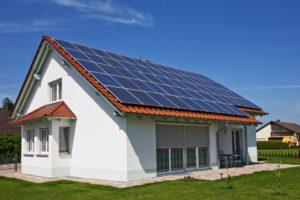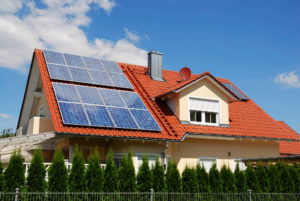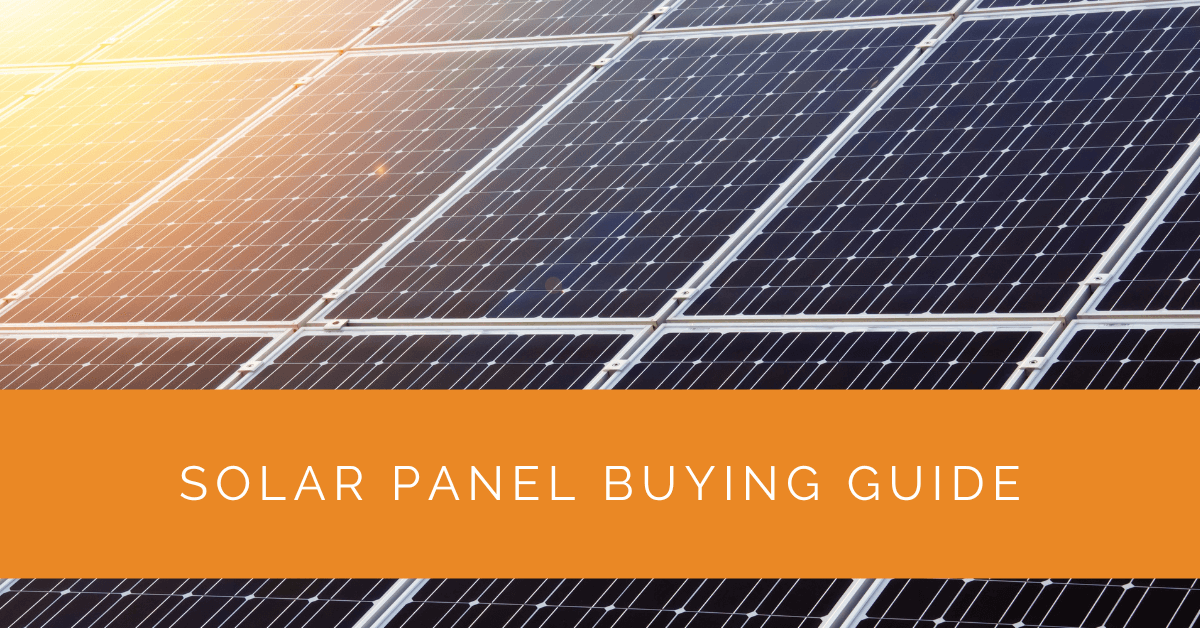In today’s world, harnessing solar energy through solar panels has become an increasingly popular choice for homeowners seeking clean and renewable energy solutions. Investing in solar panels requires careful consideration and informed decision-making. This comprehensive solar panel buying guide will explore the intricacies of buying solar panels, including their technology, types, factors to consider, installation process, and maintenance. By the end of this guide, you’ll be equipped with the knowledge to make a confident choice when buying solar panels for your home.
Contents
- 1 Key Takeaways
- 2 How Do Solar Panels Work?
- 3 Factors to Consider When Buying Solar Panels
- 4 Solar Panel Installation and Maintenance
- 5 Case Study: A Comprehensive Approach to Solar Panel Installation for a Suburban Home
- 6 Expert Insights From Our Solar Panel Installers About Buying Solar Panels
- 7 Experience Solar Excellence with Us!
- 8 Conclusion
Key Takeaways
- Understanding how solar panels work and considering factors such as sunlight availability, panel orientation, and shading can help optimize the performance of your solar panel system.
- When buying solar panels, assess your energy needs, evaluate financial considerations, and choose a reputable installer to ensure a sound investment with long-term benefits.
- Proper installation and regular maintenance, including cleaning, monitoring, and addressing warranty coverage, are essential for maximizing the efficiency and longevity of your solar panel system.
How Do Solar Panels Work?
Understanding Solar Panel Technology
Solar panels operate on the principle of the photovoltaic effect, which allows them to convert sunlight into usable electricity. The key components of a solar panel system include:
- Solar Cells: Solar cells, also known as photovoltaic cells, are the building blocks of solar panels. These cells are made of semiconductors, typically silicon, and are responsible for capturing photons from sunlight. When sunlight strikes the solar cells, electrons in the material get excited and start flowing, generating a direct current (DC) of electricity.
- Inverter: The direct current produced by solar cells is converted into alternating current (AC) through an inverter. This AC electricity is the standard form used in homes and can power your appliances and electronics.
- Grid Connection: The AC electricity generated by solar panels can be utilized within your home or fed back into the electrical grid. When you produce excess electricity, it can be supplied to the grid, and in return, you can draw power from the grid when your solar panels aren’t producing enough electricity.
Solar panels work most efficiently when they receive direct sunlight and are properly oriented and angled to optimize sun exposure. By harnessing the sun’s energy, solar panels provide a sustainable and clean source of electricity.
Factors Affecting Solar Panel Performance
Several factors can impact the performance and efficiency of solar panels:
- Sunlight Availability: The amount of sunlight your location receives throughout the year plays a vital role in determining the energy output of your solar panels. Regions with higher sun exposure tend to generate more electricity from solar panels.
- Panel Orientation and Tilt: Solar panels’ orientation and tilt angle are crucial for maximizing energy production. Generally, panels facing south receive the most sunlight in the Northern Hemisphere, while those facing north are optimal in the Southern Hemisphere. The tilt angle can be adjusted to capture the most sunlight based on your latitude.
- Shading: Shading from nearby objects, such as trees, buildings, or chimneys, can significantly reduce the energy output of solar panels. It’s important to ensure your panels are not obstructed by shading during peak sunlight hours.
- Temperature: Solar panels perform best under moderate temperatures. High temperatures can lead to a slight decrease in efficiency. However, modern solar panels are designed to handle temperature variations effectively.
Understanding these factors will help you optimize the performance of your solar panel system and make informed decisions during the installation process.

Factors to Consider When Buying Solar Panels
Assessing Your Energy Needs
Determining your energy needs is crucial in choosing the right solar panel system for your home. Consider your average monthly electricity consumption and identify any energy-intensive appliances or future additions that may impact your energy usage. This analysis will help you determine the appropriate capacity and number of solar panels to meet your energy requirements.
Additionally, consider your energy goals and aspirations. Are you aiming to offset a certain percentage of your electricity consumption or go completely off-grid? Understanding your objectives will help you size your solar panel system accordingly.
Evaluating Financial Considerations
Investing in solar panels involves financial considerations that go beyond the upfront cost. Here are some key factors to evaluate:
- Cost Analysis: Calculate the total cost of the solar panel system, including equipment, installation, permits, and any additional components. Obtain quotes from multiple solar panel installers to compare prices and ensure competitive offers.
- Return on Investment (ROI): Assess your solar panel system’s potential return on investment. Consider the savings on your electricity bills, any incentives or tax credits available, and the payback period. A shorter payback period indicates a higher ROI.
- Financing Options: Explore financing options for solar panel installations, such as solar loans or leasing agreements. Solar loans allow you to finance the system’s upfront cost and repay it over time, while leasing agreements enable you to “rent” the solar panels and pay a fixed monthly fee. Evaluate these options’ terms, interest rates, and eligibility criteria to determine the most suitable financing method for your situation.
- Incentives and Rebates: Research the incentives, rebates, and tax credits offered by government programs or local utilities. These incentives can significantly reduce the upfront cost of your solar panel system and accelerate your return on investment. Common incentives include federal investment tax credits (ITC), state-specific rebates, and net metering programs.
- Long-Term Savings: Consider the long-term financial benefits of solar panels. They can hedge against rising electricity costs, potentially eliminate or significantly reduce your monthly utility bills, and add value to your property. Evaluate the potential savings over the system’s lifespan to determine the overall financial advantage of investing in solar panels.
By conducting a comprehensive financial analysis, you can make an informed decision about the affordability and long-term value of installing solar panels.

Solar Panel Installation and Maintenance
Solar Panel Installation Process
The installation process of solar panels typically involves several steps:
- Site Assessment: A qualified solar panel installer will conduct a detailed site assessment to evaluate your property’s solar potential. Factors such as roof orientation, tilt, shading, and available space will be considered to determine the optimal placement and configuration of the panels.
- Design and Permitting: Based on the site assessment, the installer will design a customized solar panel system that meets your energy needs and complies with local regulations. They will obtain the necessary permits and approvals from local authorities before installation.
- Panel Mounting and Wiring: The solar panels will be mounted securely on your roof or other appropriate surfaces using racking systems. The installer will carefully position the panels to maximize sun exposure. They will also handle the wiring connections, ensuring proper electrical connectivity between the panels, inverter, and your home’s electrical system.
- Inverter Installation: The inverter, which converts the DC electricity generated by the solar panels into AC electricity, will be installed near your electrical panel. It will be connected to the panels and the main electrical system to ensure seamless integration and efficient power distribution.
- System Testing and Commissioning: The system will undergo comprehensive testing to verify its performance and safety once the installation is complete. The installer will ensure all components function correctly and conduct a final inspection to confirm compliance with applicable codes and standards.
Solar Panel Maintenance
Proper maintenance is essential to maximize the performance and longevity of your solar panel system. Here are some key maintenance practices:
- Regular Cleaning: Periodically clean your solar panels to remove dirt, dust, and debris that can reduce their efficiency. Use a soft brush, sponge, or squeegee and water to clean the surface gently. Avoid using abrasive materials or harsh chemicals that could damage the panels.
- Monitoring Energy Production: Monitor the energy production of your solar panel system to ensure it is operating at its full potential. Many systems come with monitoring tools or apps that allow you to track the energy output and identify any deviations or issues that require attention.
- Inspections and Servicing: Schedule periodic inspections by a qualified professional to assess the overall condition of your solar panel system. They can identify signs of wear and tear, loose connections, or potential issues that may impact performance. Promptly address any necessary repairs or maintenance to avoid any long-term impact on your system’s efficiency.
- Warranty Coverage: Understand the warranty terms provided by the manufacturer and installer. Familiarize yourself with the duration of coverage and any conditions that may impact the warranty’s validity. In case of any issues covered under the warranty, promptly contact the manufacturer or installer to initiate the warranty claim process. Documenting any maintenance or repairs conducted to ensure compliance with warranty requirements is important.
- System Upgrades and Expansion: Stay informed about advancements in solar panel technology and consider system upgrades or expansions if they align with your energy goals. Upgrading to more efficient panels or adding energy storage solutions can enhance your solar energy’s overall performance and self-consumption.
By following these maintenance practices and staying proactive in addressing any issues, you can ensure your solar panel system’s long-term effectiveness and reliability.
Case Study: A Comprehensive Approach to Solar Panel Installation for a Suburban Home
Background
At Solar Panels Network USA, we pride ourselves on delivering customized solar solutions tailored to our client’s unique energy needs. We were approached by a homeowner in a suburban neighborhood who was eager to transition to renewable energy but needed guidance on selecting and installing the right solar panel system. Our goal was to provide a comprehensive solution that would maximize energy efficiency, reduce electricity bills, and ensure long-term sustainability.
Project Overview
The client sought a solar panel system to offset their electricity consumption and reduce their carbon footprint. They needed assistance with everything from assessing their energy needs to installing and maintaining the solar panels. Our project involved detailed planning, precise installation, and ongoing support to ensure optimal performance.
Implementation
Initial Assessment and Energy Audit
We began with an in-depth energy audit to understand the client’s electricity usage. This included analyzing their monthly energy bills and identifying peak consumption periods. We also discussed the client’s long-term energy goals, including potential future increases in electricity usage due to planned home improvements or new appliances.
Financial Analysis and System Design
Next, we conducted a thorough financial analysis to determine the cost-effectiveness of the solar panel installation. We explored available incentives and rebates, such as federal tax credits and state-specific programs, to reduce the upfront costs. We also presented financing options, including solar loans, to make the investment more manageable.
Based on the energy audit and financial analysis, we designed a customized solar panel system. This included selecting high-efficiency monocrystalline panels for maximum energy production and optimal roof space utilization. We planned the panel orientation and tilt to capture the most sunlight throughout the year, ensuring consistent energy output.
Installation Process
The installation began with a site assessment to finalize the optimal placement of the panels. Our team ensured that the roof was structurally sound and free from any shading obstacles. We obtained all necessary permits and approvals, ensuring compliance with local regulations and utility requirements.
The solar panels were then securely mounted on the roof using advanced racking systems. The wiring was meticulously installed to connect the panels to the inverter and the home’s electrical system. We installed a high-quality inverter to convert the DC electricity generated by the panels into AC electricity for household use. The system was then connected to the grid, enabling net metering benefits.
Performance Monitoring and Maintenance
To ensure the system’s longevity and efficiency, we installed a solar energy monitoring system. This tool allows the homeowner to track energy production in real-time and receive alerts for any performance issues. We provided detailed instructions on using the monitoring system and offered regular maintenance services to keep the panels clean and functioning optimally.
Results
The solar panel installation successfully met the client’s energy needs, significantly reducing their monthly electricity bills. The high-efficiency panels generated ample electricity, even during peak usage periods, providing substantial savings. The client benefited from available incentives and financing options, making the investment financially viable.
The solar energy monitoring system allowed the client to monitor their system’s performance continuously, ensuring any issues were promptly addressed. Regular maintenance services ensured the panels remained clean and efficient, maximizing their lifespan and energy production.
Summary
This case study illustrates the importance of a comprehensive approach to solar panel installation. From initial assessment and financial analysis to precise installation and ongoing maintenance, each step is crucial for maximizing the benefits of solar energy. By understanding the client’s unique energy needs and providing tailored solutions, we helped them achieve significant cost savings and a more sustainable lifestyle.
At Solar Panels Network USA, we are committed to delivering top-quality solar solutions that meet our client’s specific requirements. Our expertise and dedication ensure that each project is a success, providing long-term benefits and contributing to a greener future.
Expert Insights From Our Solar Panel Installers About Buying Solar Panels
Understanding your energy needs is crucial. An accurate assessment of your electricity consumption helps determine the appropriate size and capacity of the solar panel system for your home.
Senior Solar Consultant
Proper installation is key to maximizing your solar panel system’s efficiency. Ensure your panels are oriented correctly and free from shading to achieve optimal energy production.
Lead Installation Technician
Regular maintenance, including cleaning and monitoring, ensures your solar panels perform at their best. This not only maximizes energy output but also extends the lifespan of your system.
Solar Maintenance Specialist
Experience Solar Excellence with Us!
Trust in Solar Panels Network USA, where our seasoned experts deliver top-quality solar solutions for homes and businesses nationwide. With a legacy of countless successful installations and a commitment to sustainable energy, we’re your reliable partner in the solar journey. Ready for a brighter, eco-friendly future? Call us now at (855) 427-0058 and harness the power of the sun!
Conclusion
Investing in solar panels is a significant decision that offers numerous financial and environmental benefits. Understanding how solar panels work, evaluating the factors when buying them, and implementing proper installation and maintenance practices are essential for maximizing the benefits of solar energy.
By comprehending the technology behind solar panels, considering your energy needs, evaluating financial considerations, and choosing a reputable installer, you can make an informed decision when purchasing solar panels. Conducting a thorough financial analysis, considering available incentives, and exploring financing options will help you determine solar panel ownership’s long-term cost-effectiveness and financial advantages.
Once installed, regular maintenance, cleaning, and monitoring of your solar panel system will ensure optimal performance and durability once installed. Promptly address any issues covered under warranty and consider system upgrades to maximize the efficiency and self-sufficiency of your solar energy generation.
Remember, installing solar panels allows you to harness clean and renewable energy and contributes to a more sustainable future. Embrace the power of solar energy and enjoy the benefits of reduced electricity bills, increased energy independence, and a positive environmental impact.
About the Author
Solar Panels Network USA stands at the forefront of solar energy solutions, driven by a team of seasoned solar engineers and energy consultants. With over decades of experience in delivering high-quality solar installations and maintenance, we are committed to promoting sustainable energy through customer-centric, tailored solutions. Our articles reflect this commitment, crafted collaboratively by experts to provide accurate, up-to-date insights into solar technology, ensuring our readers are well-informed and empowered in their solar energy decisions.

